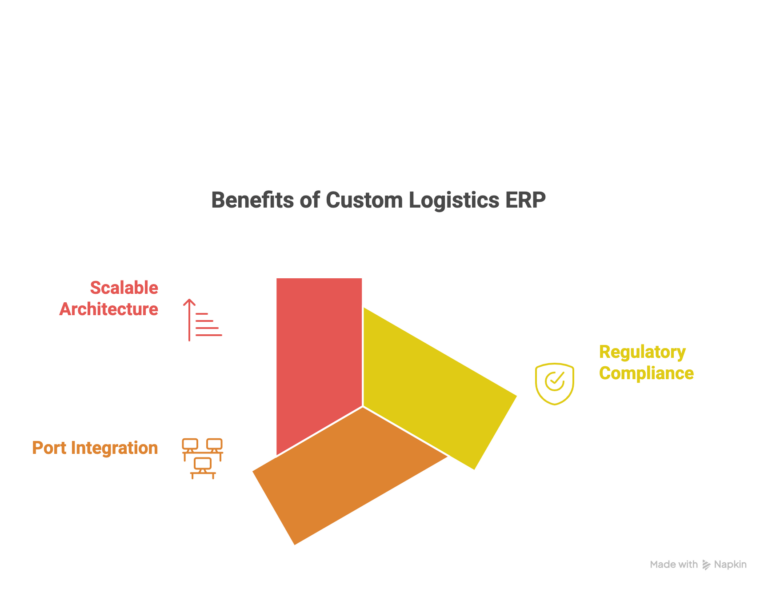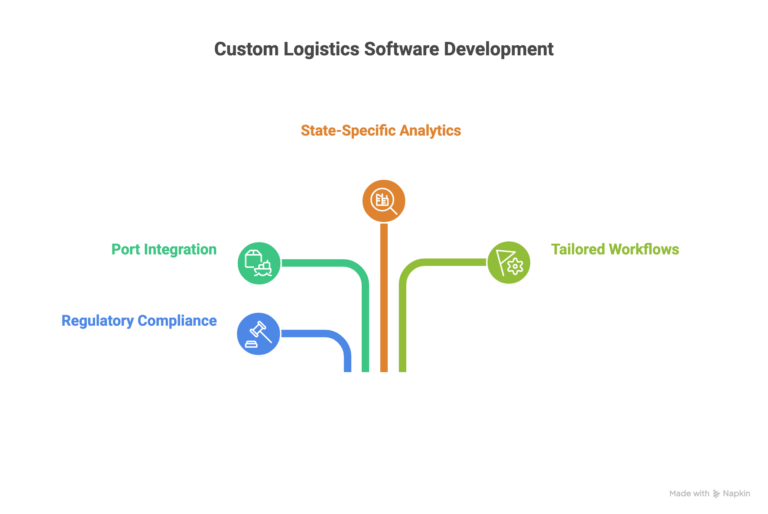Greetings! I'm Aneesh Sreedharan, CEO of 2Hats Logic Solutions. At 2Hats Logic Solutions, we are dedicated to providing technical expertise and resolving your concerns in the world of technology. Our blog page serves as a resource where we share insights and experiences, offering valuable perspectives on your queries.

Quick Summary
California logistics companies need custom ERP solutions because generic systems can’t handle state-specific regulations, port integration requirements, and complex compliance needs. Custom ERP development offers better ROI, integration, and regulatory compliance compared to off-the-shelf alternatives.
Running a logistics business in California? You’re dealing with stricter regulations, higher costs, and more complex compliance than anywhere else in the US. From AB 5 driver classification rules to zero-emission vehicle mandates, California logistics companies face unique challenges that generic ERP systems can’t handle.
California’s freight and logistics market is expected to reach USD 223.96 billion by 2030, making it the largest logistics hub in America. But with this growth comes complexity.
California exported $659.1 billion in goods in 2023, supporting a workforce of 830,000 Californians, yet many logistics companies still struggle with outdated systems that can’t keep pace with state requirements.
The solution? Custom ERP development tailored specifically for California’s logistics landscape.
Why California Logistics Businesses Struggle Without Proper ERP Systems
California logistics companies face operational nightmares when relying on manual processes or disconnected systems. The state’s complex regulatory environment demands sophisticated tracking and reporting capabilities that basic software cannot provide.
California Regulatory Compliance Challenges for Logistics Companies
California regulation requires all newly registered trucks to be zero-emission vehicles starting in 2024, creating massive compliance tracking needs. Logistics ERP solutions must monitor:
- Fleet emissions data and compliance reporting
- Driver classification under AB 5 regulations
- Clean truck certification and maintenance schedules
- Environmental impact tracking for port operations
Without proper ERP software logistics integration, companies face hefty fines and operational shutdowns. California’s clean initiative from 2020 compelled truckers to upgrade their fleets or retrofit existing vehicles, but many still lack the digital infrastructure to track compliance effectively.
Port Integration Requirements: Los Angeles and Long Beach
California’s ports collectively handle an astounding 40% of all containerized cargo entering the U.S. and nearly 30% of the nation’s exports. The San Pedro Bay Port Complex alone processes massive volumes requiring sophisticated logistics management.
California took the proactive effort to become the first in the nation to invest $27M in the development of data interoperability across its five containerized ports. This creates opportunities for logistics companies with advanced ERP systems to integrate directly with port databases, gaining competitive advantages through:
- Real-time container tracking and status updates
- Automated customs documentation processing
- Seamless port appointment scheduling
- Integrated drayage and transportation planning
Rising Insurance Costs and Driver Classification Issues
Soaring insurance expenses make it nearly impossible for new players to enter the market, and challenging even for established companies. California logistics companies need custom logistics software that can:
- Track driver performance metrics for insurance negotiations
- Monitor safety compliance across multiple locations
- Automate payroll calculations for complex classification rules
- Generate detailed reporting for insurance audits
The cumulative effects of these challenges make generic ERP systems inadequate for California operations.
Tip: Start tracking your compliance data now; waiting until you need it for audits or insurance renewals is too late.
Custom ERP Development vs Off-the-Shelf Solutions for Logistics
The choice between custom ERP development and off-the-shelf solutions can make or break California logistics operations. Here’s why custom solutions consistently outperform generic alternatives.
Why Generic ERP Software Fails California Logistics Companies
Off-the-shelf ERP systems are designed for generic business operations, not California’s unique regulatory landscape. Common failures include:
- Compliance Gaps: Generic systems lack California-specific reporting modules
- Integration Limitations: Cannot connect with state databases or port systems
- Inflexible Workflows: Fixed processes that don’t match California requirements
- Limited Customization: Vendor restrictions prevent necessary modifications
Most logistics companies discover these limitations only after expensive implementations, wasting time and resources on systems that don’t meet their actual needs.
Custom ERP Development Benefits for Transportation Businesses
Custom ERP solutions offer California logistics companies several key advantages:

Regulatory Compliance Built-In
- Native integration with California state systems
- Automated compliance reporting and tracking
- Custom workflows for state-specific requirements
- Real-time regulatory updates and alerts
Port and Infrastructure Integration
- Direct API connections to major California ports
- Automated container tracking and documentation
- Integration with transportation networks
- Real-time freight and logistics coordination
Scalable Architecture
- Grows with your business operations
- Handles California’s complex multimodal transportation
- Supports expansion across multiple locations
- Adapts to changing regulations and requirements
ERP Implementation Services Cost Comparison
| Solution Type | Initial Cost | Ongoing Costs | Customization | California Compliance |
| Off-the-Shelf | Lower upfront | High licensing fees | Limited | Requires workarounds |
| Custom ERP | Higher initial investment | Lower maintenance | Fully tailored | Built-in compliance |
Tip: While custom ERP development requires a higher initial investment, the long-term ROI significantly exceeds off-the-shelf alternatives through reduced compliance costs, improved efficiency, and better integration capabilities.
Essential ERP Software Features for California Logistics Operations
California logistics companies require specific ERP functionality to handle state regulations, port operations, and complex supply chains.
Transportation Management System Integration Requirements
A comprehensive logistics ERP solution must include robust transportation management capabilities:
Fleet Management Features:
- Real-time vehicle tracking and monitoring
- Maintenance scheduling and compliance tracking
- Driver performance analytics and safety reporting
- Fuel efficiency and emissions monitoring
Route Optimization Tools:
- Dynamic routing based on traffic and regulations
- Multi-modal transportation planning
- Automated delivery scheduling and tracking
- Cost optimization across transportation modes
Warehouse Management and Inventory Control Features
California’s massive warehouse infrastructure requires sophisticated inventory management:
Multi-Location Inventory Tracking:
- Real-time stock levels across all locations
- Automated reorder points and purchasing
- Barcode and RFID integration capabilities
- Cross-docking and distribution optimization
Warehouse Operations Management:
- Pick, pack, and ship optimization
- Labor management and productivity tracking
- Quality control and inspection processes
- Returns and reverse logistics handling
Compliance Tracking and Regulatory Reporting Tools
California logistics companies need built-in compliance management:
Regulatory Reporting Features:
- Automated compliance report generation
- Real-time regulatory update notifications
- Audit trail maintenance and documentation
- Integration with state regulatory databases
Environmental Compliance Tracking:
- Emissions monitoring and reporting
- Clean truck compliance verification
- Environmental impact assessments
- Sustainability metrics and reporting
Tip: Prioritize ERP features that automate your most time-consuming compliance tasks; this delivers immediate ROI through reduced administrative overhead.
Top ERP Software Options for California Logistics Companies
While several ERP solutions serve logistics companies, each offers different advantages for California operations.
Custom Logistics Software Development with 2HatsLogic
2HatsLogic specializes in custom ERP development specifically for California logistics companies:
California-Focused Advantages:

- Native California regulatory compliance
- Direct port system integration
- State-specific reporting and analytics
- Tailored workflows for California operations
Custom Development Benefits:
- No licensing fees or vendor lock-in
- Unlimited customization capabilities
- Dedicated support and maintenance
- Scalable architecture for growth
SAP S/4HANA for Large-Scale Logistics Operations
SAP S/4HANA provides comprehensive logistics ERP solutions for enterprise-level operations:
Strengths:
- Advanced analytics and real-time data processing
- Robust supply chain planning capabilities
- Strong financial management and reporting
- Extensive third-party integration options
California Considerations:
- Requires significant customization for state compliance
- Complex implementation process
- High total cost of ownership
- Limited out-of-the-box California-specific features
Oracle NetSuite for Mid-Size Transportation Companies
Oracle NetSuite offers cloud-based ERP software with logistics functionality:
Strengths:
- Scalable cloud-based architecture
- Integrated CRM and ecommerce capabilities
- Real-time inventory and order management
- Strong financial management tools
California Considerations:
- Generic compliance modules require customization
- Limited port integration capabilities
- Subscription-based pricing model
- Requires additional modules for full logistics functionality
Microsoft Dynamics 365 for Multi-Modal Logistics
Microsoft Dynamics 365 combines ERP and CRM functionality:
Strengths:
- Integration with the Microsoft ecosystem
- AI-driven demand forecasting capabilities
- Flexible deployment options
- Strong collaboration tools
California Considerations:
- Requires extensive customization for logistics
- Limited transportation management features
- Complex licensing structure
- Generic compliance capabilities
California Logistics ERP Requirements vs Generic Solutions
| Requirement | Generic ERP | Custom ERP Solutions |
| California Compliance Tracking | Manual workarounds | Built-in automation |
| Port System Integration | Third-party tools required | Native API connections |
| Multi-Modal Transportation | Limited functionality | Comprehensive management |
| Regulatory Reporting | Manual report generation | Automated compliance reports |
Generic ERP systems require extensive customization and third-party integrations to meet California logistics requirements, often resulting in higher total costs and reduced functionality compared to purpose-built custom solutions.
ERP Implementation Services Process for California Logistics Businesses
Successful ERP implementation requires careful planning and execution, especially for California’s complex logistics environment.
Pre-Implementation Assessment and Planning
Business Requirements Analysis:
- Document current operational workflows
- Identify California-specific compliance needs
- Assess integration requirements with existing systems
- Define success metrics and KPIs
Technical Infrastructure Review:
- Evaluate current IT infrastructure capabilities
- Identify necessary hardware and software upgrades
- Plan data migration and integration strategies
- Establish security and backup protocols
Custom ERP Development Timeline and Phases
Phase 1: Discovery and Design
- Requirements gathering and documentation
- System architecture design
- User interface mockups and workflows
- Project timeline and milestone planning
Phase 2: Development and Configuration
- Core system development and customization
- Integration with California state systems
- User interface development and testing
- Data migration and validation
Phase 3: Testing and Quality Assurance
- System testing and bug resolution
- User acceptance testing
- Performance optimization
- Security testing and validation
Testing and Deployment for Logistics Operations
Pilot Deployment Strategy:
- Start with a single location or department
- Gradual rollout to minimize operational disruption
- Continuous monitoring and optimization
- User training and support
Go-Live Support:
- 24/7 technical support during transition
- Real-time issue resolution
- Performance monitoring and optimization
- User adoption tracking and improvement
Tip: Plan your ERP implementation during slower operational periods to minimize disruption and allow adequate training time.
How Much Does Custom ERP Development Cost for Logistics Companies
Understanding ERP implementation costs helps California logistics companies make informed investment decisions.
ERP Implementation Services Pricing Breakdown
| Cost Components | Factors Affecting Cost |
|---|---|
| Initial development and customization | Company size and complexity |
| Integration with existing systems | Number of locations and users |
| Data migration and testing | Integration requirements |
| Training and documentation | Customization level needed |
| Ongoing support and maintenance | Timeline and implementation approach |
ROI Timeline for California Logistics ERP Investment
Immediate Benefits:
- Reduced manual data entry and processing
- Improved accuracy in order processing
- Better visibility into operations
- Streamlined compliance reporting
Medium-term Benefits:
- Optimized inventory management
- Improved customer service levels
- Reduced operational costs
- Better regulatory compliance
Long-term Benefits:
- Strategic decision-making capabilities
- Competitive advantage through efficiency
- Scalability for business growth
- Reduced total cost of ownership
Hidden Costs of Off-the-Shelf ERP Solutions
Ongoing Expenses:
- Annual licensing fees
- Customization and integration costs
- Training and support expenses
- Upgrade and maintenance fees
Compliance Costs:
- Third-party compliance modules
- Manual processes for California requirements
- Audit and reporting expenses
- Penalty costs for non-compliance
Custom ERP solutions eliminate many hidden costs through built-in compliance and no licensing fees.
2HatsLogic Custom ERP Solutions for California Logistics Success
2HatsLogic specializes in developing custom ERP solutions specifically for California logistics companies, understanding the unique challenges and requirements of operating in the state.
Why Choose 2HatsLogic as Your ERP Development Company
California Logistics Expertise:
- Deep understanding of state regulations
- Experience with port integration requirements
- Knowledge of California transportation networks
- Proven track record with logistics companies
Custom Development Advantages:
- No vendor lock-in or licensing fees
- Unlimited customization capabilities
- Direct integration with California systems
- Scalable architecture for growth
Comprehensive Services:
- Requirements analysis and planning
- Custom development and configuration
- Integration and data migration
- Training and ongoing support
California Logistics ERP Case Studies and Results
2HatsLogic has helped numerous California logistics companies transform their operations through custom ERP development, delivering measurable improvements in efficiency, compliance, and profitability.
Common Results:
- Reduced compliance processing time
- Improved inventory accuracy
- Enhanced customer satisfaction
- Better regulatory compliance
- Increased operational efficiency
Ready to Transform Your California Logistics Operations?
California logistics companies can’t afford to struggle with generic ERP systems that don’t understand state requirements. Custom ERP development offers the compliance, integration, and scalability needed to succeed in California’s complex logistics environment.
The investment in custom ERP solutions delivers long-term value through reduced compliance costs, improved efficiency, and competitive advantages that generic systems simply cannot provide.
Don’t let inadequate ERP systems hold your California logistics business back.
Table of contents
- Why California Logistics Businesses Struggle Without Proper ERP Systems
- Custom ERP Development vs Off-the-Shelf Solutions for Logistics
- Essential ERP Software Features for California Logistics Operations
- Top ERP Software Options for California Logistics Companies
- California Logistics ERP Requirements vs Generic Solutions
- ERP Implementation Services Process for California Logistics Businesses
- How Much Does Custom ERP Development Cost for Logistics Companies
- 2HatsLogic Custom ERP Solutions for California Logistics Success
- Ready to Transform Your California Logistics Operations?

Related Articles







